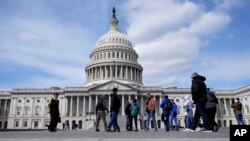After days of delay, U.S. congressional leaders unveiled a $1.1 trillion bipartisan spending measure for defense, homeland security and other programs early on Thursday, giving lawmakers less than two days to avert a partial government shutdown.
The Republican-controlled House of Representatives will vote on the sprawling package on Friday, leaving the Democratic-majority Senate only hours to pass the package of six bills that covers about two-thirds of the $1.66 trillion in discretionary government spending for the fiscal year that began on Oct. 1.
"These final six bills represent a bipartisan and bicameral compromise," the two top Senate negotiators - Patty Murray, a Democrat, and Susan Collins, a Republican - said in a statement.
"They will invest in the American people, build a stronger economy, help keep our communities safe, and strengthen our national security and global leadership."
The Congressional Budget Office warned that U.S. deficits and debt will grow considerably over the next 30 years, forecasting that the nation's $34.5 trillion national debt, which currently represents about 99% of GDP, could grow and rise to 166% of GDP by 2054.
Democratic Senate Majority Leader Chuck Schumer said he is "hopeful" Congress can avert a shutdown if Democrats and Republicans in his chamber work together.
The compressed schedule raised the risk of at least a brief partial shutdown after a Friday midnight deadline, unless Schumer can reach agreement with Senate Republicans to expedite the bill.
House Speaker Mike Johnson touted what he called a series of wins for Republicans, from higher spending for U.S. defense and border security to a cutoff of U.S. funding for the main United Nations relief agency that provides humanitarian assistance to Palestinians in Gaza.
"This FY24 appropriations legislation is a serious commitment to strengthening our national defense by moving the Pentagon toward a focus on its core mission," Johnson said in a statement released along with the text of the legislation.
Democrats said they blocked some Republican cuts and policy measures and touted funds aimed at lowering childcare costs, supporting small businesses and fighting the flow of the opioid fentanyl.
"We defeated outlandish cuts that would have been a gut punch for American families and our economy - and we fought off scores of extreme policies that would have restricted Americans’ fundamental freedoms, hurt consumers while giving giant corporations an unfair advantage, and turned back the clock on historic climate action," said Murray, the Democratic chair of the Senate Appropriations Committee.
Two weeks ago, Congress narrowly avoided a shutdown that would have affected agricultural, transportation and environmental programs.
The text unveiled on Thursday fills in the details of an agreement in principle between Johnson and Schumer, which Democratic President Joe Biden has pledged to sign into law.
With a slim 219-213 House Republican majority, Johnson will have to rely on Democratic votes to get the spending bill to the Senate.
Many House Republicans are still expected to oppose the legislation, including hardliners who want steeper spending cuts.
Besides the departments of Homeland Security and Defense, the bill would fund agencies including the State Department and the Internal Revenue Service as it girds for its April 15 taxpayer filing deadline.











